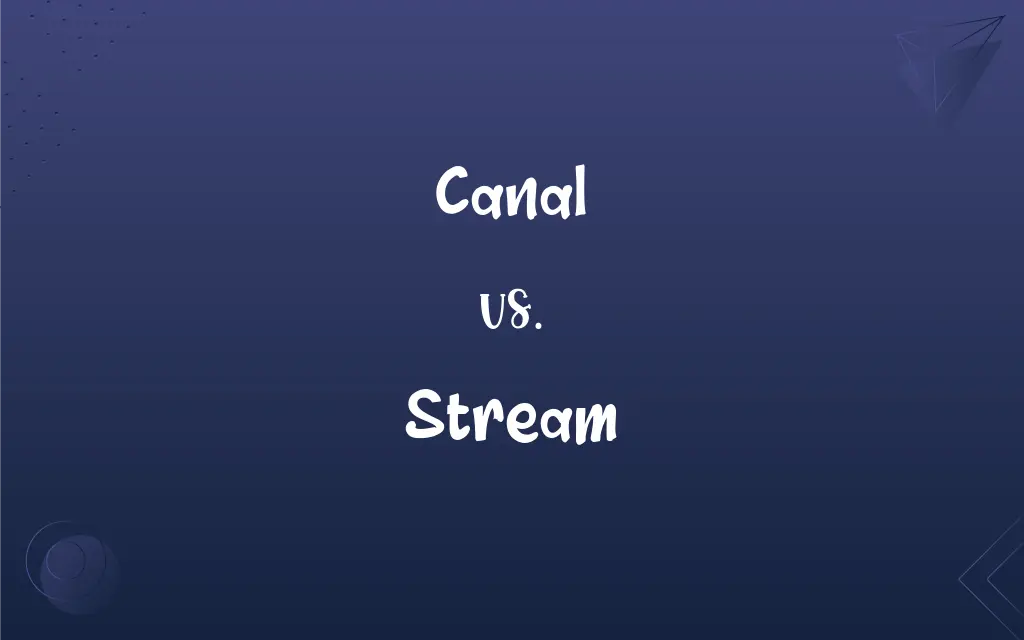Canal vs. Stream: What's the Difference?
Edited by Harlon Moss || By Janet White || Updated on September 27, 2023
A canal is a human-made waterway constructed for navigation, irrigation, or drainage, while a stream is a natural flowing body of water, typically smaller than a river.

Key Differences
Canal and stream represent two distinct types of waterways, with the primary difference being that a canal is man-made, while a stream is a natural watercourse. A canal is typically constructed for specific purposes such as irrigation, navigation, or water supply, indicating a certain level of intention and design. In contrast, a stream forms naturally due to the flow of water on the earth's surface, typically originating from a source like a spring or a snowmelt and moving towards a larger body of water, showing the untamed and organic aspect of nature.
While both canals and streams serve as conduits for water, the flow in a canal is usually controlled, often by locks or gates, to facilitate its intended use. This reflects the human intervention and regulation present in canals. In comparison, streams have an uncontrolled flow, driven by gravity and the natural slope of the terrain, portraying the spontaneous and dynamic character of natural watercourses.
Canals are generally characterized by their uniform and linear appearance, denoting the planning and construction involved in their creation. They often have defined widths and depths to meet their functional requirements. Conversely, streams can exhibit variability in their width, depth, and course, adapting to the natural landscapes they traverse. This variability in streams emphasizes their inherent diversity and adaptability to environmental conditions.
In terms of ecosystem, canals may not always support a diverse range of flora and fauna due to their artificial nature and possible alterations in water quality. On the other hand, streams often host diverse ecosystems, providing habitats for various aquatic and terrestrial species, underscoring the ecological importance and vitality of natural water bodies.
Comparison Chart
Origin
Human-made
Natural
ADVERTISEMENT
Purpose
Constructed for navigation, irrigation, or water supply.
Flows naturally, serving ecological purposes.
Flow Control
Typically has controlled flow.
Exhibits uncontrolled, natural flow.
Appearance
Uniform and linear.
Variable and adapts to the landscape.
Ecosystem
May lack diverse ecosystems.
Often supports diverse ecosystems.
Canal and Stream Definitions
Canal
An artificial watercourse designed for irrigation.
The canal provides essential irrigation to the arid region.
ADVERTISEMENT
Stream
A small, natural flowing body of water.
The stream winds through the forest, providing water to the wildlife.
Canal
A constructed channel filled with water used for power generation.
The canal directs water to the hydroelectric power plant.
Stream
A continuous flow of liquid or gas.
A stream of water came out from the broken pipe.
Canal
A human-made waterway constructed for navigation.
The Panama Canal is a key conduit for international maritime trade.
Stream
A continuous flow of data or information.
The data stream was transmitting information rapidly.
Canal
A tube or tubular passage in an organ or a body structure.
The birth canal plays a vital role during childbirth.
Stream
A movement of people or things in a steady, continuous manner.
A stream of commuters flowed out of the subway station.
Canal
An artificial waterway or artificially improved river used for travel, shipping, or irrigation.
Stream
A course of water that is usually smaller than a river and larger than a brook.
The serene stream is a habitat for various freshwater fishes.
Canal
(Anatomy) A tube, duct, or passageway.
Stream
A flow of water in a channel or bed, as a brook, rivulet, or small river.
Canal
(Astronomy) One of the faint, hazy markings resembling straight lines on early telescopic images of the surface of Mars.
Stream
A steady current in such a flow of water.
Canal
To dig an artificial waterway through
Canal an isthmus.
Stream
A steady current of a fluid.
Canal
To provide with an artificial waterway or waterways.
Stream
A large amount or number moving or occurring in steady succession
A stream of commuters.
A stream of insults.
Canal
An artificial waterway or artificially improved river used for travel, shipping, or irrigation.
Stream
A trend, course, or drift, as of opinion, thought, or history.
Canal
(anatomy) A tubular channel within the body.
Stream
A beam or ray of light.
Canal
(astronomy) One of the faint, hazy markings resembling straight lines on early telescopic images of the surface of Mars; see Martian canals
Stream
Chiefly British A course of study to which students are tracked.
Canal
To dig an artificial waterway in or to (a place), especially for drainage
Stream
(Computers) A steady flow of data.
Canal
To travel along a canal by boat
Stream
To flow in a stream or current.
Canal
An artificial channel filled with water and designed for navigation, or for irrigating land, etc.
Stream
To pour forth or give off a stream; flow
My eyes were streaming with tears.
Canal
A tube or duct; as, the alimentary canal; the semicircular canals of the ear.
Stream
To move or arrive in large numbers; pour
Traffic was streaming by. Fan mail streamed in.
Canal
A long and relatively narrow arm of the sea, approximately uniform in width; - used chiefly in proper names; as, Portland Canal; Lynn Canal.
Stream
To extend, wave, or float outward
The banner streamed in the breeze.
Canal
(astronomy) an indistinct surface feature of Mars once thought to be a system of channels; they are now believed to be an optical illusion
Stream
To leave a continuous trail of light.
Canal
A bodily passage or tube lined with epithelial cells and conveying a secretion or other substance;
The tear duct was obstructed
The alimentary canal
Poison is released through a channel in the snake's fangs
Stream
To give forth a continuous stream of light rays or beams; shine.
Canal
Long and narrow strip of water made for boats or for irrigation
Stream
To emit, discharge, or exude (a body fluid, for example).
Canal
Provide (a city) with a canal
Stream
(Computers) To transmit or receive (audio or video content), especially over the internet, in small, sequential packets that permit the content to be played continuously as it is being received and without saving it to a hard disk.
Canal
A duct or channel serving to convey liquids.
The root canal in teeth serves as a passage for nerves and blood vessels.
Stream
A small river; a large creek; a body of moving water confined by banks.
Stream
A thin connected passing of a liquid through a lighter gas (e.g. air).
He poured the milk in a thin stream from the jug to the glass.
Stream
Any steady flow or succession of material, such as water, air, radio signal or words.
Her constant nagging was to him a stream of abuse.
Stream
All moving waters.
Stream
(computing) A source or repository of data that can be read or written only sequentially.
Stream
(figurative) A particular path, channel, division, or way of proceeding.
Haredi Judaism is a stream of Orthodox Judaism characterized by rejection of modern secular culture.
Stream
A division of a school year by perceived ability.
All of the bright kids went into the A stream, but I was in the B stream.
Stream
A live stream.
Stream
(intransitive) To flow in a continuous or steady manner, like a liquid.
Stream
(intransitive) To extend; to stretch out with a wavy motion; to float in the wind.
A flag streams in the wind.
Stream
(transitive) To discharge in a stream.
The soldier's wound was streaming blood.
Stream
(Internet) To push continuous data (e.g. music) from a server to a client computer while it is being used (played) on the client.
Stream
A current of water or other fluid; a liquid flowing continuously in a line or course, either on the earth, as a river, brook, etc., or from a vessel, reservoir, or fountain; specifically, any course of running water; as, many streams are blended in the Mississippi; gas and steam came from the earth in streams; a stream of molten lead from a furnace; a stream of lava from a volcano.
Stream
A beam or ray of light.
Stream
Anything issuing or moving with continued succession of parts; as, a stream of words; a stream of sand.
Stream
A continued current or course; as, a stream of weather.
Stream
Current; drift; tendency; series of tending or moving causes; as, the stream of opinions or manners.
Stream
To issue or flow in a stream; to flow freely or in a current, as a fluid or whatever is likened to fluids; as, tears streamed from her eyes.
Beneath those banks where rivers stream.
Stream
To pour out, or emit, a stream or streams.
A thousand suns will stream on thee.
Stream
To issue in a stream of light; to radiate.
Stream
To extend; to stretch out with a wavy motion; to float in the wind; as, a flag streams in the wind.
Stream
To send forth in a current or stream; to cause to flow; to pour; as, his eyes streamed tears.
It may so please that she at length will streamSome dew of grace into my withered heart.
Stream
To mark with colors or embroidery in long tracts.
The herald's mantle is streamed with gold.
Stream
To unfurl.
Stream
A natural body of running water flowing on or under the earth
Stream
Dominant course (suggestive of running water) of successive events or ideas;
Two streams of development run through American history
Stream of consciousness
The flow of thought
The current of history
Stream
A steady flow (usually from natural causes);
The raft floated downstream on the current
He felt a stream of air
Stream
The act of flowing or streaming; continuous progression
Stream
Something that resembles a flowing stream in moving continuously;
A stream of people emptied from the terminal
The museum had planned carefully for the flow of visitors
Stream
To extend, wave or float outward, as if in the wind;
Their manes streamed like stiff black pennants in the wind
Stream
Exude profusely;
She was streaming with sweat
His nose streamed blood
Stream
Move in large numbers;
People were pouring out of the theater
Beggars pullulated in the plaza
Stream
Rain heavily;
Put on your rain coat-- it's pouring outside!
Stream
Flow freely and abundantly;
Tears streamed down her face
FAQs
Can a stream originate from a spring?
Yes, streams can originate from springs, snowmelt, or other natural sources.
Can canals be natural?
Typically, canals are human-made, but some natural channels are modified and called canals.
Is a stream always flowing?
While streams are typically flowing, some may experience intermittent flow based on precipitation and source availability.
Do all canals have locks and gates?
Not all, but many canals have locks and gates to control water flow and levels.
Can a canal host aquatic life?
Some canals can host aquatic life, but the diversity may be limited compared to natural water bodies.
Can a canal be used for irrigation?
Absolutely, many canals are constructed specifically for irrigation purposes.
Are there different types of streams?
Yes, streams can be of various types, like perennial, ephemeral, or intermittent, based on their flow characteristics.
Can the flow of a stream be slow?
Yes, the flow of streams can range from slow to rapid, depending on the slope and other factors.
Are all canals straight and uniform?
No, while canals are often uniform, they can have varying shapes based on the terrain and purpose.
Is the course of a stream always constant?
No, a stream’s course can change due to natural processes like erosion or human intervention.
Can a stream be a habitat for wildlife?
Yes, streams often host diverse ecosystems and serve as habitats for various species.
Can streams be found in various geographical landscapes?
Yes, streams can be found in a variety of landscapes, from mountains to plains.
Can a canal be a tourist attraction?
Yes, some canals, like the Venice Canals, are famous tourist attractions.
Are canals always deep?
The depth of canals can vary based on their purpose and design.
About Author
Written by
Janet WhiteJanet White has been an esteemed writer and blogger for Difference Wiki. Holding a Master's degree in Science and Medical Journalism from the prestigious Boston University, she has consistently demonstrated her expertise and passion for her field. When she's not immersed in her work, Janet relishes her time exercising, delving into a good book, and cherishing moments with friends and family.
Edited by
Harlon MossHarlon is a seasoned quality moderator and accomplished content writer for Difference Wiki. An alumnus of the prestigious University of California, he earned his degree in Computer Science. Leveraging his academic background, Harlon brings a meticulous and informed perspective to his work, ensuring content accuracy and excellence.































































